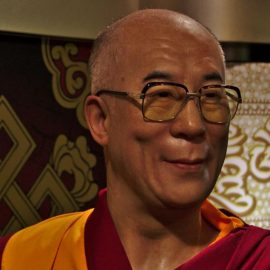

This article is an excerpt from the Shortform book guide to "The Monk Who Sold His Ferrari" by Robin Sharma. Shortform has the world's best summaries and analyses of books you should be reading.
Like this article? Sign up for a free trial here .
What is radiant living? How does The Monk Who Sold His Ferrari suggest you achieve radiant living?
The 10 rituals of radiant living are practices shared in The Monk Who Sold His Ferrari. These practices include the rituals of abundant knowledge, personal reflection, early awakening, the spoken word, and congruent character.
Keep reading for the ten rituals of radiant living.
Ten Rituals of Radiant Living
John asks how he can practice kaizen. Julian responds by telling him about ten simple rituals. They only take about an hour to complete, but they must be performed every single day. Julian promises that John will see dramatic improvement in thirty days if he follows these rituals of radiant living.
1) The Ritual of Solitude. Take 15-50 minutes every day to simply sit alone, in silence. Do this someplace that you find beautiful, because beauty soothes the mind. The space can be as simple as a spare room, or even a corner of a room that you decorate to your liking.
As with all rituals, the Ritual of Solitude works best if done at the same time every day.
2) The Ritual of Physicality. As caring for your mind will improve your body, so will caring for your body improve your mind. Therefore, you should spend at least five hours a week exercising for radiant living. Julian offers yoga as an example, which all of the Sages of Sivana practice. However, any type of physical activity that you enjoy will work.
On a related note, proper breathing will vastly improve your energy. Take a minute or two to really concentrate on your breathing. It should be deep. If your belly expands slightly when you breathe, then you are taking proper, deep breaths. Cup your hands over your stomach if you have trouble focusing on it, and see if they move when you breathe. Do this 2-3 times a day.
3) The Ritual of Live Nourishment To strengthen your body and restore your energy, eat a diet of “live foods.” In other words: fresh fruits, vegetables, and grains. Avoid meat and processed foods. You could start by adding a salad to every meal and having fruit for dessert, instead of processed sweets or unhealthy baked goods.
You may keep eating meat if you don’t want to give it up entirely (remember, don’t do anything just because you “have to,”) but try eating it occasionally instead of with every meal.
4) The Ritual of Abundant Knowledge. Read for thirty minutes every day. Choose what you read carefully—remember to only let the right thoughts into the garden of your mind. The ritual of abundant knowledge is essential for radiant living.
For example, the Sages of Sivana spend many days reading the teachings and treatises of their ancestors, while Julian enjoys reading biographies of people he admires. (Shortform note: Fiction also has many wonderful ideas to share.)
And don’t just read the books, study them. Think deeply about what you’re reading and how it applies to you. Books can give you new information, but the lessons all come from within you. This is the essence of enlightenment: studying in order to understand yourself.
5) The Ritual of Personal Reflection. Take some time every evening to think about your day. Consider the things you did that day, and whether they were productive or harmful. This will quickly and clearly show you things you can improve on. When you find a positive thought or action, resolve to keep putting energy into it. If you find a negative one, make a clear and specific plan to get rid of it.
For example, John realizes that he could remove a lot of stress from his day by simply waking up a little earlier. Then he wouldn’t feel so rushed and he could keep better control of his temper.
It may be helpful to keep a journal of each day. Write down not only what you did, but what you thought, as best as you can remember. At first it may be hard to remember your thoughts from the day, but with practice you’ll find that your memory gets clearer. Personal reflection helps you along the path to radiant living.
6) The Ritual of Early Awakening. In short, get up each day at dawn, or at least earlier than you’re used to. Most people sleep more than they need, and can function perfectly well on six hours of sleep a night. (Shortform note: Most modern research suggests that adults should get anywhere from 7-9 hours of sleep per night, depending on personal needs. To learn more about this research, read our summary of Why We Sleep.)
You will likely feel very tired for the first few days you do this, perhaps for as long as a week as you start your practice of early awakening. However, this is short-term discomfort for long-term benefit. The key to making this Ritual work is to sleep deeply and peacefully. The ten minutes before you go to bed and the ten minutes after you wake up are crucial. Only peaceful and inspirational thoughts should be in your mind during those times. Watching the news, for example, would not be ideal. Instead, have a cup of tea, meditate, read a good book, or do whatever relaxes you.
Then, after rising early, make sure to start your day off properly. Do something that will put you in a positive, constructive mind frame. For example, try going for a walk in nature, watching the sunrise, listening to your favorite music, or meditating on the good things in your life.
The Sages of Sivana would force themselves to laugh, even if they did not feel like laughing, just to put themselves in a better mood in the morning. (Shortform note: Research shows that laughing stimulates your body and releases helpful chemicals. Even fake laughter has a real impact on your mind and body.)
7) The Ritual of Music. Simply spend some time every day listening to music that you enjoy, even if it’s just in the car on the way to work. Also, try using music to rest and recover when you’re feeling drained.
8) The Ritual of the Spoken Word. Find a mantra or two that are meaningful to you. A mantra is a simple phrase that can be repeated a great number of times, to positive effect.
For example, to motivate himself, Julian might say that he is inspired, excited, and disciplined. He repeats this mantra out loud 200-300 times; but if you don’t want to use the spoken word, written mantras are equally effective. Repeating a simple phrase numerous times focuses your mind and influences your self-image.
9) The Ritual of Congruent Character. Take time every day to work on improving yourself, in line with certain virtues for congruent character. The virtues are: industry, compassion, humility, patience, honesty, and courage. When everything you do is congruent (which is to say, in agreement with) those virtues, you can be sure that what you’re doing is right. This Ritual is similar to kaizen, but more specific.
The Sages of Sivana live their lives by their Dharma, but Dharma should be based in these virtues.
10) The Ritual of Simplicity. Focus on living a simple, uncluttered life. Find your goals and your priorities and work toward them, without wasting energy on unimportant things.
Also, reduce your needs. For example, Julian gave up his expensive clothes, stopped reading so many newspapers, and let go of the need to be available to everyone at all times. He suggests that John practice this Ritual by not answering the phone every time it rings, not eating out so often, and giving up his golf club membership in order to spend time with his family instead.
Then, going a bit more extreme, he suggests that John sell his cell phone and pager. However, he also says that John should only do what works for him.
Not everyone has to adopt every strategy in order to see improvement. Moderation is key in all things, including simplifying your life.

———End of Preview———
Like what you just read? Read the rest of the world's best book summary and analysis of Robin Sharma's "The Monk Who Sold His Ferrari" at Shortform .
Here's what you'll find in our full The Monk Who Sold His Ferrari summary :
- Why your career success might actually be killing you
- How to live a simple and fulfilling life
- The 10 rituals you should practice for health and healing






